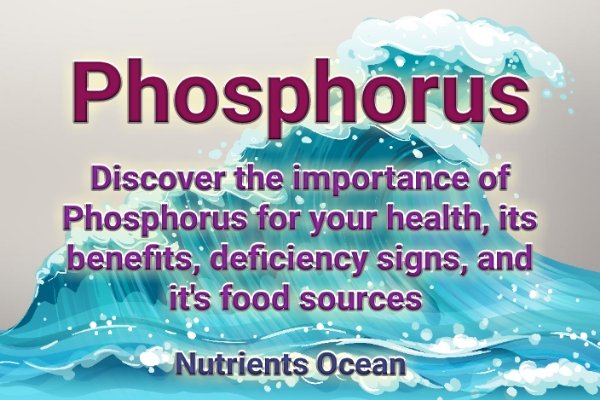Phosphorus
Welcome to the world of phosphorus – a mineral often overlooked but essential for optimal health and vitality. Let’s delve into the importance of phosphorus and explore its numerous health benefits.
The Importance of Phosphorus
Phosphorus is like the backbone of our bodies, playing a fundamental role in various physiological processes. From building strong bones and teeth to supporting energy metabolism and cell function, phosphorus is indispensable for our overall well-being.
Health Benefits of Phosphorus
1. Bone Health:
Phosphorus works hand in hand with calcium to keep our bones strong and resilient, reducing the risk of osteoporosis and fractures.
2. Energy Metabolism:
Need a boost? Phosphorus helps convert food into energy, ensuring we have the stamina to power through our daily activities.
3. Cellular Function:
Phosphorus is involved in DNA and RNA synthesis, cell signaling, and maintaining the pH balance within our cells, essential for overall cellular health.
4. Muscle Function:
Phosphorus plays a role in muscle contraction and relaxation, supporting optimal muscle function and athletic performance.
5. Kidney Health:
Phosphorus helps regulate kidney function and may play a role in preventing kidney stones by binding to calcium and preventing its buildup in the kidneys.
Food Sources of Phosphorus
Here are some food sources rich in phosphorus and ways to include them in your diet to meet your body’s needs:
1. Meat and Poultry:
Chicken, turkey, beef, lamb, organ meats (such as liver and kidney). Grill or bake chicken breasts for a lean protein source. Add sliced turkey to sandwiches or wraps. Incorporate beef or lamb into stir-fries or stews.
2. Fish and Seafood:
Salmon, tuna, trout, mackerel, sardines, shrimp. Grill or bake salmon fillets for a heart-healthy meal. Make tuna salad sandwiches or add canned tuna to pasta dishes. Enjoy grilled shrimp skewers as a tasty appetiser or main course.
3. Dairy Products:
Milk, yoghourt, cheese, cottage cheese. Start your day with a bowl of yoghurt topped with fresh fruit and granola. Use milk as a base for smoothies or oatmeal. Sprinkle grated cheese over salads, soups, or baked dishes for added flavour.
4. Nuts and Seeds:
Almonds, walnuts, peanuts, sunflower seeds, pumpkin seeds.
Ways to Include: Snack on a handful of mixed nuts for a satisfying and nutritious snack. Add chopped nuts or seeds to salads, yoghurt, or oatmeal. Use nut butters as a spread on toast or in smoothies.
5. Whole Grains:
Brown rice, quinoa, oats, barley, whole wheat bread. Cook up a batch of quinoa to use as a base for grain bowls or salads. Swap refined grains for whole grains in recipes such as risottos or pilafs. Enjoy a hearty bowl of oatmeal topped with fruit and nuts for breakfast.
6. Legumes:
Lentils, chickpeas, black beans, kidney beans, tofu. Make a flavorful lentil soup or stew for a nutritious meal. Whip up a batch of homemade hummus using chickpeas as a dip or spread. Add tofu to stir-fries or salads for a plant-based protein boost.
7. Eggs:
Eggs (chicken, duck, quail). Enjoy eggs as a versatile ingredient in dishes such as omelettes, frittatas, or scrambled eggs. Hard-boil eggs for a convenient on-the-go snack or salad topping.
Incorporating a variety of these phosphorus-rich foods into your meals and snacks can help ensure you meet your body’s phosphorus needs for optimal health and vitality. Remember to pair them with other nutrient-dense foods to create balanced and satisfying meals.
Signs and Symptoms of Phosphorus Deficiency
1. Weak Bones:
Brittle bones and an increased risk of fractures may indicate a phosphorus deficiency, as this mineral is crucial for bone strength.
2. Fatigue:
Feeling constantly tired and lacking energy could be a sign of phosphorus deficiency, as it’s involved in energy metabolism.
3. Poor Appetite:
Loss of appetite or changes in taste perception may signal a deficiency in phosphorus, affecting overall nutrient intake.
4. Muscle Weakness:
Weakness or muscle pain may occur due to inadequate phosphorus levels, impacting muscle function and performance.
5. Irritability:
Changes in mood, irritability, or difficulty concentrating may be associated with phosphorus deficiency, affecting cognitive function.
Ways to Determine Phosphorus Deficiency
1. Blood Test:
A blood test can measure phosphorus levels, providing insights into potential deficiency.
2. Bone Density Scan:
Assessing bone density through a DEXA scan can help identify phosphorus-related bone disorders like osteoporosis.
3. Symptom Assessment:
Paying attention to signs and symptoms of deficiency, coupled with professional evaluation, can aid in determining phosphorus insufficiency.
In conclusion, phosphorus may not always steal the spotlight, but its importance to our health cannot be overstated. From supporting bone health and energy metabolism to aiding in muscle function and beyond, phosphorus is a powerhouse nutrient essential for our well-being. By recognizing the signs of deficiency and ensuring adequate phosphorus intake through a balanced diet or supplementation, we can harness the benefits of this vital mineral for optimal health and vitality.











